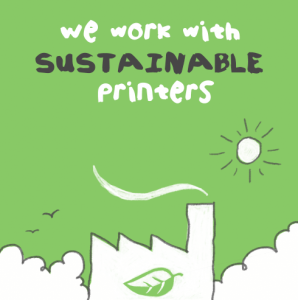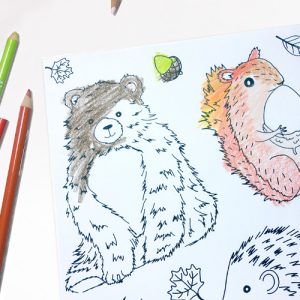Our journey to maximum sustainability
9 minute readWhen it comes to companies and their attitude to sustainability, there is a joke told by comedian Eddie Izzard which comes to mind:
As a child, everybody lies.
“It wasn’t me, Charlie did it. I was dead at the time.”
“I haven’t even asked you the question yet... Have you done your teeth?”
“Yes! No! What’s the right answer? It wasn’t me.”
But as you grow older, you start to tell the truth in odd situations to show people how mature you are.
“I’m terribly sorry, but I’ve just broken this glass. I hope it wasn’t expensive.”
And people think “Ooh, what a strong personality.”
“And I broke this as well, and now that’s gone, and I’ve just thrown the cat out the window…”
No surprise that our own Eddie Beaver is a fan of fellow Eddie Izzard. But believe it or not, there is a not-too-tenuous connection between that joke and the approach companies take towards their sustainability commitments.
Our paper is 50% recycled! (Just don't ask about the rest, please)
With Greenwashing in full swing, it’s so important for companies to show concern for the environment these days that it’s now unusual to find packaging which doesn’t include some sort of reference to the environment.
These initial stabs at sustainability stop short of Eddie Izzard’s outright lies but are the corporate equivalent of not being fully representative of the truth.
“Company X's paper contains recycled materials” (but is also made up of illegally logged Indonesian rainforest)
“Company Y's products are plastic-free” (but we send it to you in a plastic pouch, because it’s cheaper)
“Company Z uses organically grown palm oil” (which destroyed natural habitats to be planted in the first place).
Don't get us wrong. Any step by companies to work more sustainably is a step in the right direction, but in the vast majority of cases, this is not just the first step, it is the only step they ever take.
However, as a company’s attitude to sustainability matures and they really look at the impact their products have on the planet, you see an odd transformation:
As much as talking about the positive ways they produce their goods, they also focus on the negative aspects of their products and how they attempt to offset them.
From Patagonia: “Our cotton is as organic as it comes, but cotton itself is still a terrible material environmentally, so we try to use other materials where possible”
From Mymuesli: “Our packaging contains plastic, but we’re doing everything we can to reduce it”
From Allbirds: “We offset our carbon, but that's not enough. We think that it’d be even better if we didn’t emit any carbon in the first place."
From Eddie “And I’ve just thrown the cat out the window…”
 From day one, Librio has printed our books on beautiful 100% recycled paper. Even when Europe’s largest recycled paper producer went out of business last year, we took months to find a suitable replacement (which actually turned out to be better than the original). However, there are certain aspects of our production which are not as sustainable as we would like them to be, so we thought it’d be interesting to take a look behind the scenes to see where we are now and where we’d like to be in the future.
From day one, Librio has printed our books on beautiful 100% recycled paper. Even when Europe’s largest recycled paper producer went out of business last year, we took months to find a suitable replacement (which actually turned out to be better than the original). However, there are certain aspects of our production which are not as sustainable as we would like them to be, so we thought it’d be interesting to take a look behind the scenes to see where we are now and where we’d like to be in the future.
It all comes down to this simple paradox:
Our goal is to make products which will last a lifetime for the child that receives it but will not last an eternity on planet earth.
In a Librio utopia, our books are so loved and cherished, that they are passed down from generation to generation.
“This is the book your great-great-great grandmother’s uncle bought way back in the year 2020.”
“What’s a book?”
In reality, our products will, eventually, end up back in the earth.
Getting this balance right between longevity, durability, quality and sustainability is very tricky, both from a cost perspective and an availability of materials perspective.
Our biggest challenges:
Plastic covers
To make our books durable for repeated reading, the soft touch coating on the cover is a plastic laminate. It may feel organic and sustainable, but plastic is plastic. It does protect the books very well, though.
This is a surmountable problem. We are working with our print partners to find sturdier alternatives which don’t require laminate. There are also laminates out there which are made of bio plastic. However, they are significantly more expensive and are not as reliable in providing a high-quality finish as the ones we currently use. We strongly believe we’ll solve this issue in the not-distant future. It’s currently one of our main production goals.
Recycled paper
Not all recycled paper is created equal. Whilst it’s indisputable that any form of recycled paper is better than virgin pulp paper, the chemicals used in the process vary. The paper we use ranges from Very Sustainable to As Sustainable As It Comes, but we are working with all our partners to try to ensure that we are always using the best all the time.
Digital Inks and glues
The printers we use to print our books are modern marvels. Churning out millions of high-quality personalised materials a year, they have revolutionised printing and book production in the last decade. However, the ink they use is not biodegradable. When the physical materials our books are printed on are long gone, the chemicals from our ink will still be making their mark on the world.

Although we ensure that the print partners we choose take the utmost care to produce in as sustainable way as possible, given the current manufacturing constraints, this is a depressingly tricky one to solve. There are biodegradable inks, but none that are available to our digital printers. In the very long term, it’s conceivable that more sustainable inks will come on the market, but until then, we are at the behest of the digital printing companies. The same also goes for the glue used on our printers' binding machines.
One option we are looking at is using biodegradable inks wherever possible for non-print-on-demand jobs. For example, when printing flyers or additional printed materials. It’s dramatically more cumbersome and expensive, but we believe it’s worth it.
Something which shouldn't be understated is that, in contrast to the vast majority of products on the market, we only create books when an order has been placed, so there is no overproduction. We produce what we need and nothing more, which is about as sustainable as you can get when it comes to production.
Packaging
Most cardboard boxes you receive in the mail are predominantly made of recycled materials and ours are no different. However, the outer layer is almost always non-recycled material to add an extra layer of strength to the package.
Our books need to arrive in pristine condition, so we need strength, but we believe the whole package should be 100% recycled and 100% recyclable (which again means biodegradable ink is required). By making our packaging extra special and unique, we encourage customers to reuse it for their own packages rather than just putting it straight onto the recycling pile.
Shipping
Our books are shipped individually from the printer to the customer. This is inherently not very environmentally friendly.
We work wherever possible to have a printer in each of our major markets. This brings the benefit of speed to our customers and shorter transit distances for our carbon footprint. We are also exploring greener shipping options (our packages in Switzerland are all carbon neutral).
Here’s an interesting video exploring the environmental impact of express shipping. Funnily enough, the fact that our books take 2-3 days to produce means that the lead time is long enough not to necessitate offering super-fast shipping options. If you’re happy to wait 4 days for our products, chances are 5 days would also be OK.
In general
Over the years, we’ve seen a really positive shift in the way we’ve produced printed materials. Everything we print is always on 100% recycled paper, but, wherever possible, we also try to make it so that anything we create has more than one use.

An info card in our art prints has a picture to colour in on the back. Our inserts to share with your friends double up as bookmarks. Our packaging doubles up as wrapping paper. Our business cards are printed on paper created t-shirt industry cotton offcuts. This has been a really fun part of our development cycle. Every additional item we create must serve a purpose and whoever possible, it should serve another purpose beyond its original purpose.
It’s not always easy or financially possible to solve these issues, but it’s become a central part of our mission. Companies like ours need to develop those initial difficult steps with our production partners so that they in turn can offer those solutions to other companies in the future.
At the end of the day, for Librio, it’s not just about creating products which children and parents love. It’s about creating them in a way which is rewarding for us and sustainable for the planet, even if those parents and children don’t see everything which goes on behind the scenes.
Whilst any product which gets manufactured can never be environmentally perfect, we can always aim to minimise our impact. If you want to give a gift with 0 environmental impact, give the gift of spending time with your little one. If you want minimal environmental impact, look for a company like Librio which really cares. If you want maximum environmental impact, buy a LOL Surprise Doll.
We hope you’ve enjoyed this look into where we are on our journey towards sustainability. From our customer survey, we know it’s something very close to our customer’s hearts and creating products in the most sustainable way possible is one of the most gratifying aspects of what we do.





No Comments